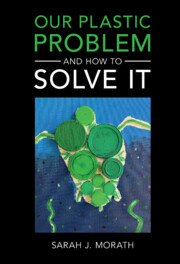Book contents
- Our Plastic Problem and How to Solve It
- Our Plastic Problem and How to Solve It
- Copyright page
- Contents
- Acknowledgments
- Abbreviations
- Introduction
- Part I Plastic in the Environment
- 1 The Proliferation of Plastic
- 2 Measuring Plastic
- 3 Plastic as a Pollutant
- Part II Multimodal Approaches to Solving Our Plastic Problem
- Part III Innovation and Design
- Index
1 - The Proliferation of Plastic
from Part I - Plastic in the Environment
Published online by Cambridge University Press: 17 March 2022
- Our Plastic Problem and How to Solve It
- Our Plastic Problem and How to Solve It
- Copyright page
- Contents
- Acknowledgments
- Abbreviations
- Introduction
- Part I Plastic in the Environment
- 1 The Proliferation of Plastic
- 2 Measuring Plastic
- 3 Plastic as a Pollutant
- Part II Multimodal Approaches to Solving Our Plastic Problem
- Part III Innovation and Design
- Index
Summary
Mr. McGuire:
I want to say one word to you. Just one word.
Benjamin:Yes, sir.
Mr. McGuire:Are you listening?
Benjamin:Yes, I am.
Mr. McGuire:Plastics.
Benjamin:Exactly how do you mean?
Mr. McGuire:There's a great future in plastics. Think about it. Will you think about it?
Mr. McGuire was onto something when, in 1967, he told Benjamin Braddock in The Graduate that there was a great future in plastics. Although mass production of plastics was just taking off in the 1960s, plastic is ubiquitous today. Plastic is inexpensive, lightweight, and durable, making it useful to almost any industry – from construction to electronics to transportation to packaging. The characteristics that make plastic so useful, however, also make it problem.
Plastic is everywhere. Recent reports have found plastic in the ocean’s deepest trench and in the mountain air of the French Pyrenees. How does plastic turn up in such remote locations? Chapter 1 provides some answers, briefly tracing the development and growth of mass-produced plastics from the turn of the twentieth century to today. This chapter lays the foundation for a discussion of measuring plastic in our environment in Chapter 2 and plastic’s impact on our health, ecosystem, and economy presented in Chapter 3.
Keywords
- Type
- Chapter
- Information
- Our Plastic Problem and How to Solve It , pp. 7 - 21Publisher: Cambridge University PressPrint publication year: 2022

